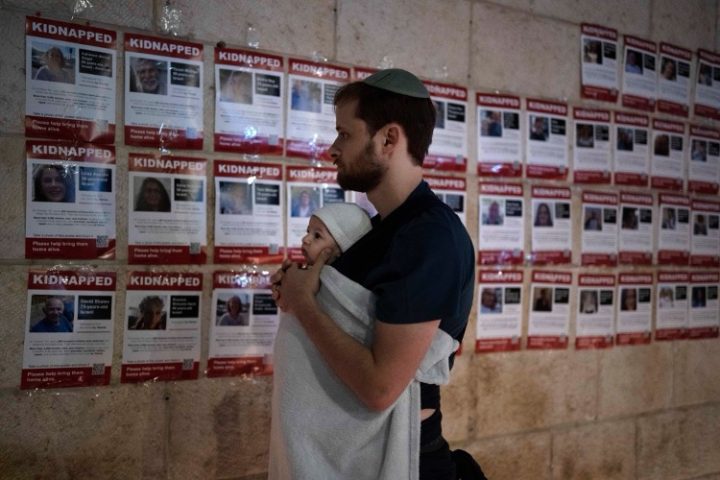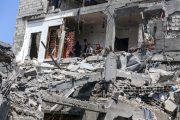
Israel and Hamas are moving toward a hostage deal that could lead to the liberation of most of the Israeli women and children held captive by the Palestinian terrorist group Hamas since the latter’s October 7 attack on civilians, The Washington Post reported on November 13, quoting a senior Israeli official.
“The general outline of the deal is understood,” the Post’s source revealed, adding that the agreement could be unveiled within several days once details have been sorted out.
Based on the report, the deal could entail freeing Israeli prisoners in groups in exchange for the concurrent liberation of Palestinian women and young people held by West Jerusalem.
In a statement on November 13, Abu Ubaida, spokesman for Hamas’ al-Qassam Brigades, said that the group was open to liberating up to 70 Israeli children and women in exchange for a five-day truce.
An unidentified Arab official told the Post that Israel was holding at least 120 Palestinian women and young people in prisons, but Ubaida claimed that Hamas has been seeking the freeing of as many as 200 Palestinian children and 75 women.
Besides a prisoner swap and temporary truce, a potential agreement could enable more international aid to Gaza, which has been under “complete siege” for several weeks now, a source told the Post.
Israel reportedly hopes to verify the exact identities of those to be freed. An Israeli official interviewed by the Post stated that a factor in the hostage talks is that although the “vast majority” of the hostages are held by Hamas, others are held captive by other groups. That being said, the official reportedly pointed out that Hamas “has the power to negotiate for nearly all of them.”
Hamas launched the October 7 brutal attack on Israel last month and took more than 240 hostages, including not only members of the military, but also civilians and foreign nationals. In turn, West Jerusalem retaliated by conducting air and missile strikes on Gaza, later declaring a “complete siege” of the Palestinian enclave and starting a ground operation there.
Through today, the terrorist group has freed four people — a mother and daughter from Chicago and two elderly Israeli women. Qatar, which hosts Hamas’ political bureau in Doha, played a key role in securing this release, with various media reports indicating that the country continues to have significant mediation power in the conflict.
On November 12, the Post reported that new evidence seems to hint that Hamas had hoped to strike even deeper into Israel during its October 7 attack, citing sources. The newspaper claimed that the Palestinian terrorist group had clandestinely plotted their attack for more than a year before October 7. During that period, measures were supposedly taken to deceive Israeli intelligence services, giving them a false sense of security.
The Post interviewed more than a dozen intelligence officials from four Western and Middle Eastern countries, who alleged Hamas had planned “to strike a blow of historic proportions” against Israel. One senior official in West Jerusalem told the newspaper that “they planned a second phase [of the assault], including in major Israeli cities and military bases.”
The Post’s sources posited that the Hamas terrorists had planned beforehand to commit mass atrocities in Israel, with one order recovered from the body of a Hamas fighter reportedly reading, “Kill as many people and take as many hostages as possible.”
Although some Hamas shock troops succeeded in covering about half of the distance from Gaza to the West Bank, many are said to have transported ample supplies and ammunition to continue operations for several days. These troops also reportedly had reconnaissance data and maps, hinting that they had plans to reach the Palestinian enclave.
According to one former U.S. official cited by the Post, this would have represented “a huge propaganda win” for Hamas and dealt “a symbolic blow” not only against Israel, but also against the Palestinian Authority. The latter, which is based in the West Bank, has been at odds with Hamas since Hamas deposed it from Gaza in 2007.
The same Post article on November 12 also pointed out that before its attack on Israel, Hamas had participated in multi-pronged reconnaissance activities, depending on intel gathered using cheap drones, Gazan workers who were permitted to enter Israel, and even real estate photos and social media posts.
On November 15, Russian Foreign Minister Sergey Lavrov said in an exclusive interview to RT that the United States does not wish to limit Israel’s military actions against Hamas in Gaza.
When asked to remark on why he believed the United States blocked Russia’s resolutions in the UN seeking to cease violence in the Palestinian enclave, Lavrov stated that Washington “is highly ideologized.” “Anything coming from Russia is taken as a hostile act…. But on substance, and on practical terms Washington does not want to tie Israel’s hands,” he asserted.
Lavrov highlighted that such a strategy works with Israel, elaborating that the United States tried to convince Israel to be “a little flexible” on supplies of humanitarian aid to hospitals in the besieged enclave, as well as on letting foreigners leave Gaza.
The first Russian-sponsored resolution after Hamas launched the October 7 attack urged for an immediate ceasefire, denouncing all acts of terrorism. However, the United States, the U.K., France, and permanent members of the UN Security Council, as well as Japan, blocked the Russian-led document.
Later in October, Moscow tabled another iteration of the resolution that reinforced calls for a sustainable humanitarian ceasefire and the establishment of humanitarian corridors, while including some points from a U.S.-sponsored document. Nevertheless, Washington, along with London, vetoed the proposal.
Israel proceeded with its incursion into the Gaza enclave in late October, despite media reports claiming that the United States had tried to persuade it to postpone its operations to buy time for hostage releases.
Last week, left-wing news outlet Axios also reported that, under pressure from Washington, Israel agreed to begin “tactical, localized humanitarian pauses,” as the United States stated clearly that the request was not meant to compel the Israelis into a ceasefire.



